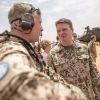What Germans think about foreign policy
Germany is taking responsibility in world politics – what that means and what people in Germany think about it is outlined in the study “The Berlin Pulse”.

Germany. Restraint or involvement? “The Berlin Pulse” analyses Germany’s role in global politics. Published at the beginning of December, this Körber-Stiftung study combines international partner’s expectations of Germany and a survey of Germans’ attitudes towards their country’s foreign policy. Clear differences emerged.
What are the most important findings?
- According to survey participants, the three most important areas for German global engagement are ensuring security for Germany and its allies and the fight against terrorism (71%), environmental and climate protection (67%) and human rights (64%). However, acceptance of the idea that Germany should intervene more strongly in international conflicts is only increasing slowly. In 2016, 41% shared this opinion; now the total is 43%.
- The refugee crisis is viewed as the greatest challenge for foreign policy (26%), followed by the relationship with the USA under President Trump (19%) and with Turkey (17%).
- The majority of survey participants believe Africa is the region of the world that Germany should support most in future. This applies with regard to migration and combating the causes of migration, because forecasts indicate that the population of Africa could double by 2055.
- One in two participants believe that Germany maintains the right balance between compromise and pursuing its interests within the EU. Some 88% are in favour of a European defence partnership, but only 39% support the idea of a European finance minister.
Quick facts
Where are there differences between the internal and external views?
A small majority of Germans regard a restrained presence on the world stage as appropriate. However, politicians from all regions of the world and representatives of international organisations call upon Germany to step out of the shadow of its past and assume even more responsibility.
Germany should be the Beckenbauer of global Europe.
What do international policymakers and experts say?
In guest contributions to “The Berlin Pulse 2017” a number of international policymakers and experts formulate expectations of Germany’s role in world politics. A selection:
- Former US Secretary of State Condoleezza Rice states: “A vibrant democracy and strong economy like Germany has to be active in the international community.”
- NATO Secretary General Jens Stoltenberg says: “Germany is at the heart of Europe, its largest economy, and at the heart of our Alliance. What Germany does matters for NATO, for Europe, and for international security.”
- The British historian and winner of the Charlemagne Prize, Timothy Garton Ash, compares Europe with a football team. German does not necessarily have to act as the manager, but as an important player who keeps the team together: “Germany should be the Beckenbauer of global Europe.”
Who took part in the survey?
Every year the Körber-Stiftung commissions a representative survey of Germans’ view of foreign policy. In October, 1,005 Germans over the age of 18 were asked questions on 29 issues for the 2017 study.
The Berlin Pulse 2017 (PDF)
